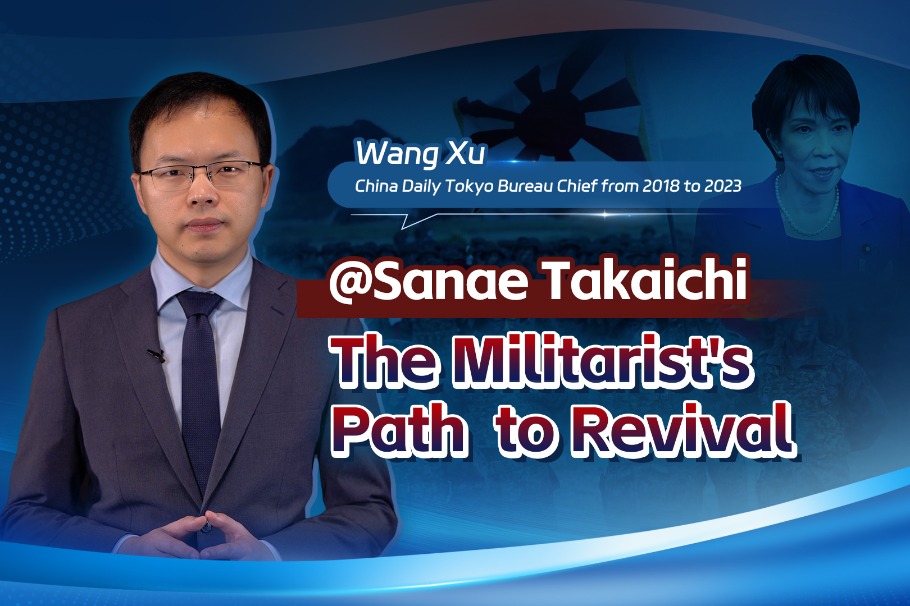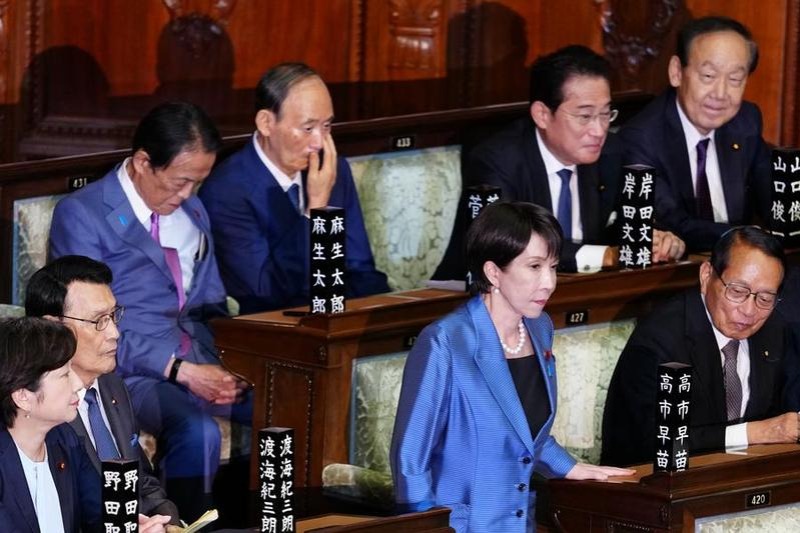Takaichi government must pull back from the brink of militarist revival: China Daily editorial

The diplomatic crisis ignited by Japanese Prime Minister Sanae Takaichi's erroneous remarks on the Taiwan question is a political calculus integrated into the Takaichi government's attempts to revive militarism in Japan.
At this critical juncture, the Takaichi government should deeply reflect on Japan's wartime responsibilities, immediately correct its mistakes, retract Takaichi's egregious statements, and refrain from going further down a path that leads only to confrontation and instability.
China's position has been made unequivocally clear. Fu Cong, China's permanent representative to the United Nations, has submitted a formal letter to the UN chief detailing why Takaichi's comments constitute the most serious provocation by a Japanese leader since 1945.
Takaichi's remarks mark the first time since Japan's defeat in 1945 that a Japanese leader has advocated in an official setting the notion that "a contingency for Taiwan is a contingency for Japan" and linked it to the exercise of the right of collective self-defense; the first time Japan has expressed ambitions to intervene militarily in the Taiwan question; and the first time Japan has issued a threat of force against China, openly challenging China's core interests. Her rhetoric is a blatant violation of international law and the fundamental norms governing international relations.
Taiwan is China's territory, and how to resolve the Taiwan question is a matter for the Chinese people and brooks no foreign interference. If Japan dares to attempt an armed intervention in the cross-Strait situation, it would be an act of aggression. China will resolutely exercise its right of self-defense under the UN Charter and international law and firmly defend its sovereignty and territorial integrity. No responsible Japanese leader should ever trivialize these stakes.
This year marks the 80th anniversary of the victory in the Chinese People's War of Resistance Against Japanese Aggression (1931-45) and the World Anti-Fascist War. The restoration of Taiwan to China is clearly stipulated in international legal instruments, including the Cairo Declaration, the Potsdam Proclamation and the Japanese Instrument of Surrender. This outcome represents not only a core achievement of the world's victory over fascism, but also an enduring international obligation that Japan, as a defeated nation, must honor without equivocation.
Japan must confront the crimes it committed under its militarist regime and act prudently on issues relating to Taiwan and history. Instead, Takaichi has done the opposite — sending dangerously wrong signals by openly challenging China, attempting to justify military intervention, and crossing red lines that should never be breached. China has no choice but to respond firmly — not only to defend its sovereignty, but also to protect the postwar international order secured through immense sacrifice, and to uphold international justice and human conscience.
The repercussions of Takaichi's stance are already visible. Reportedly, risk aversion has intensified in financial markets, with investors selling Japanese assets amid heightened uncertainty. Japanese economists warn that a decline in Chinese tourism alone could cause Japan losses of up to 2.2 trillion yen ($14.07 billion) and slash 0.36 percent from its GDP. The consequences of provoking China will prove grave for Japan's economy.
Takaichi's posture also exposes a deeper, more unsettling trend: the reemergence of right-wing attempts to break Japan's postwar restraints. Japan has begun exporting Patriot missiles to the United States under eased restrictions, while the ruling Liberal Democratic Party is actively discussing revisions to core security documents, including the Three Non-Nuclear Principles. These developments directly contradict the obligations imposed by the Potsdam Proclamation and the Japanese Instrument of Surrender, which mandated complete demilitarization and prohibited Japan from maintaining industries enabling rearmament.
Japan's pacifist Constitution — drafted to ensure the nation would never again embark on militarist expansion — is being hollowed out by politicians seeking confrontation rather than peace. Takaichi's narrative of a "survival-threatening situation" is nothing more than a pretext to justify constitutional revision, expand military capabilities and abandon peaceful development.
Anxiety is mounting within Japan. Some commentators have bluntly stated that Takaichi's very existence is Japan's survival crisis, reflecting genuine fear that she is steering the country toward a historical disaster.
As Foreign Minister Wang Yi warned on Saturday, China will never allow right-wing forces in Japan to turn back the wheel of history, nor permit external forces to meddle in China's Taiwan region or allow Japanese militarism to stage a comeback.
The Potsdam Proclamation's warning in 1945 remains strikingly relevant today: "There must be eliminated for all time the authority and influence of those who have deceived and misled the people of Japan into embarking on world conquest, for we insist that a new order of peace, security and justice will be impossible until irresponsible militarism is driven from the world."
If Japan continues in the dangerous direction being pushed by Takaichi, it will have to bear the consequences.
Japan can either follow the path of reason or repeat the reckless decisions that once led it to disaster. The choice now lies squarely before the nation.


































